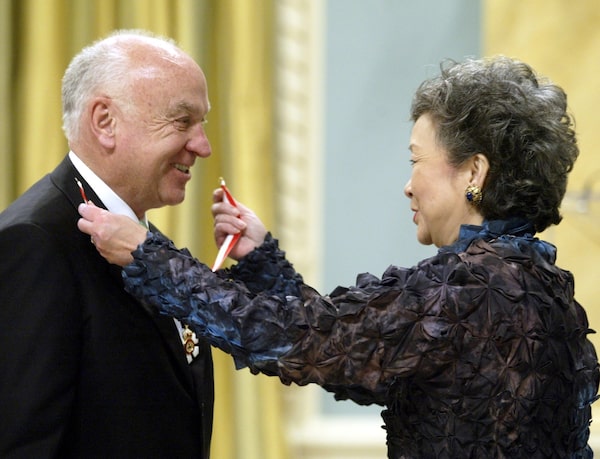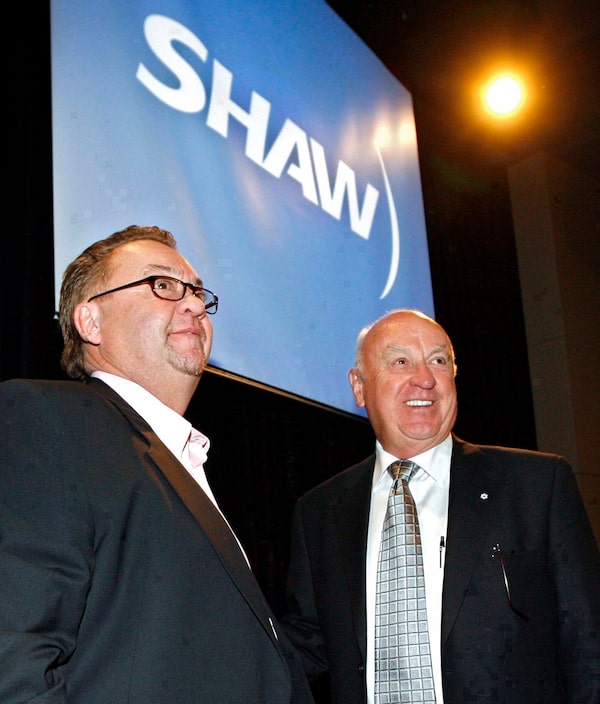JR Shaw, seen here in his Calgary home on April 4, 2007, built Shaw Communications into a multi-billion-dollar business.TODD KOROL/The Globe and Mail
JR Shaw’s quest to expand a fledgling cable provider into a multibillion-dollar family empire took him to some unexpected places.
The Edmonton-based entrepreneur had been snapping up small cable operators, and in the mid-1990s an opportunity arose for Shaw Communications Inc. to expand beyond its home base of Western Canada by acquiring Scarborough, Ont.-based CUC Broadcasting Ltd.
To seal the deal, Mr. Shaw went to visit Julia Conway – CUC’s largest shareholder and the widow of its founder, Geoffrey Conway – in the hospital, where she was expecting a baby, recalls former Shaw president Peter Bissonnette.
“He was such a wonderfully warm person that she felt that she could entrust him with her husband’s legacy," Mr. Bissonette said.
The ensuing deal to acquire CUC for $635-million in cash and notes turned Shaw into the second-largest cable operator in Canada at the time, and is illustrative of Mr. Shaw’s signature deal-making style.
“He could charm anyone,” said Rogers vice-chairman Phil Lind, who has known Mr. Shaw for decades. Mr. Shaw’s people skills made all of his acquisitions seamless and devoid of controversy, often sailing past the industry regulator, the Canadian Radio-television and Telecommunications Commission (CRTC), without even a hearing, Mr. Lind recalls.
“It was smooth as silk for the Shaws.”
Mr. Shaw, a telecom industry pioneer who founded Shaw Communications Inc. during the infancy of cable television, died peacefully on Monday at the age of 85. He leaves his wife, Carol; son, Brad; daughters, Heather and Julie; sisters, Bertha and Dolly; as well as several grandchildren and a great-grandchild.
Friends describe him as a selfless family man with an intuitive sense for business opportunities, whose lavish lifestyle and fiercely competitive streak were balanced by his generosity and big heart.
“He’s one of these people who models love of family, love of the community and business acumen," said Brian Felesky, a tax lawyer and friend of Mr. Shaw. "He never separated those three; they were eclipsing spheres in his life.”

Former governor general Adrienne Clarkson presents Shaw with the Order of Canada during an investiture ceremony at Rideau Hall in Ottawa on May 9, 2003.JONATHAN HAYWARD/The Canadian Press
James Robert Shaw was born on Aug. 14, 1934, in Brigden, Ont., a small agricultural community roughly 20 kilometres southeast of Sarnia. The youngest of four, he spent winters playing hockey on frozen creeks and ponds and learned the value of hard work by observing his parents, Francis and Lottie Shaw, on the family farm.
In 1956, while studying business administration at Michigan State University, Mr. Shaw married his high-school sweetheart, Carol Bulman. She played an important role in his life, steering him through countless business decisions.
The pair moved to Edmonton where, dissatisfied with his television choices, Mr. Shaw launched a startup cable provider called Capital Cable Television Co. Ltd. Cable TV was just beginning to take off when he won his first broadcasting licence from the CRTC in 1970.
Over the following years he expanded the company by forging relationships with small cable companies and persuading them to sell to him. His people skills served him well, but he could be resolute, as well.
For instance, in 1995 he uprooted the company and his family from their home in Edmonton because he felt that then-mayor Janice Reimer was hampering Shaw’s growth.

Jim Shaw, left, CEO of Shaw Communications, and JR Shaw, executive chair, smile following their addresses to shareholders at the company's annual meeting in Calgary on Jan. 10, 2008.Jeff McIntosh/The Canadian Press
It was a pivotal time for building out fibre networks and Ms. Reimer had changed the rules overnight, effectively blocking Shaw from investing in infrastructure, Mr. Bissonnette said.
Mr. Shaw refused to accept such a standstill, particularly as it would have left Shaw at a disadvantage to its rival Telus Corp., which was building out its own fibre network unimpeded, Mr. Bissonnette said.
“As much as Edmonton was so important to the company – it was a part of our identity – he was not going to be blocked by a mayor,” Mr. Bissonnette said.
“JR was competitive. He knew that if he acquiesced in Edmonton – because everything is precedential – then why wouldn’t Vancouver do the same thing? Or why wouldn’t Calgary, or Toronto?”
Within several months Shaw had relocated its headquarters to Calgary, where it remains to this day.
As the company grew, Mr. Shaw indulged in life’s luxuries. He acquired properties, including a winter home in Hawaii and the Eagle Pointe fishing lodge in Prince Rupert, where he treated his friends to fine dining and fireworks displays.
“He had such a sense of flair in terms of enjoying life," Mr. Felesky said, recalling a small group excursion to Eagle Pointe Lodge for which Mr. Shaw had brought a chef out from Calgary. “It was just a wonderful experience of discussing philosophy and strategy over gourmet dining and elegant wines."
His collection of Canadian art was so impressive that he lined the walls of Shaw Court, the company’s headquarters, with original pieces and had an art curator on staff.
By 1998, when Mr. Shaw handed the reins over to his older son, Jim, Shaw’s market capitalization had climbed to $2.2-billion. Over the next dozen or so years, Jim – with JR’s guidance – expanded the company into a vertically integrated telecom and media empire.
In spite of the Shaws’ competitive nature, they knew how to collaborate, as well. For instance, a deal struck between JR and Ted Rogers, then CEO of Rogers Communications Inc., culminated in the companies carving up English Canada and swapping cable assets in each other’s regions. Jim, who died in 2018 after a brief illness, presided over that cable swap in 2000, which saw Rogers take control in the east and Shaw in the west.
Even after stepping down as CEO, JR continued to be compensated generously. As executive chairman, he was collecting an annual salary of $1.2-million. He also had a “founder’s agreement” bonus plan that was to pay him 0.5 per cent to 1 per cent of company profit each year. In 2019, he agreed to reduce his payout to 0.35 per cent of profit, and still received a $6.8-million bonus. The company estimated that as of Aug. 31, it owed him a pension of $62.8-million.
But he was also known for his generosity and his philanthropic efforts. Mr. Felesky recalls how, in order to win the Shaw family’s business, Mr. Shaw required him to make a substantial donation to the Mazankowski Alberta Heart Institute. JR had been deeply moved when his friend, Canadian politician Donald Mazankowski, struggled with heart problems and “beat the pavement” to raise funds to advance treatment of the disease, Mr. Felesky said.
He also cared deeply about children and could be easily brought to tears, Mr. Bissonnette said. In 1989, Mr. Shaw launched a program to deliver teddy bears to kids in stressful situations through first responders or community organizations. He personally monitored how many bears had been given out and read letters of thanks from parents. “His eyes would well up because of how good he felt about being able to do something for children," Mr. Bissonnette said.
Even in his final years, he remained deeply involved in the company.
“I spoke to JR every day about the business," his son Brad, Shaw’s current CEO, said in a statement. “He was engaged and interested in everything the company was doing – from the latest technology being rolled out to how we were meeting the needs of families across Western Canada.”
Tributes from Canada’s top telecom executives poured in after Mr. Shaw’s death. Telus CEO Darren Entwistle called him a “formidable competitor" and lauded his numerous philanthropic endeavours while BCE Inc. chief executive Mirko Bibic described him as an “inspirational entrepreneur.”
Edward Rogers, the son of Mr. Shaw’s long-time ally Ted Rogers, meanwhile, said he was deeply saddened to hear of the passing of a “true pioneer.”
“Shaw led the Canadian cable industry for many decades as an innovator and long-term investor … his legacy will be felt for generations to come,” Mr. Rogers said in a statement.
Editor’s note: A quote in this obituary was mistakenly attributed to the late Ted Rogers. It was actually his son, Edward Rogers, who made the statement. This version has been corrected.
 Alexandra Posadzki
Alexandra Posadzki